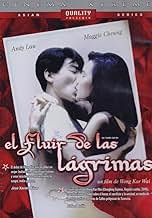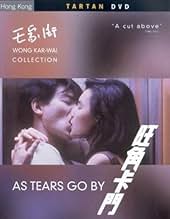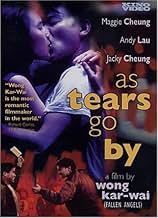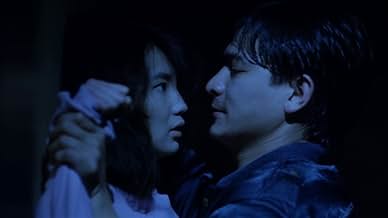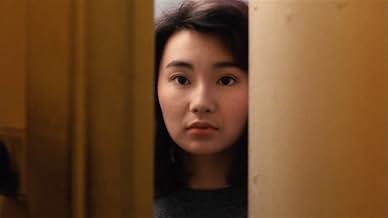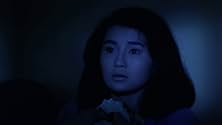NOTE IMDb
7,0/10
13 k
MA NOTE
Le gangster de niveau intermédiaire Wah tombe amoureux de sa belle cousine, mais doit également continuer à protéger son instable complice et ami, Fly.Le gangster de niveau intermédiaire Wah tombe amoureux de sa belle cousine, mais doit également continuer à protéger son instable complice et ami, Fly.Le gangster de niveau intermédiaire Wah tombe amoureux de sa belle cousine, mais doit également continuer à protéger son instable complice et ami, Fly.
- Réalisation
- Scénario
- Casting principal
- Récompenses
- 2 victoires et 10 nominations au total
Avis à la une
I'm by no means a Kar Wai Wong aficionado; I've only seen 2 of his films (this and his follow-up feature "Days of Being Wild"). But from what I've seen, this is the best place to start.
Kar Wai Wong films are very artistic, and from a technical perspective they are downright miraculous. However, as is the case with many artistic directors, an over emphasis on art can result in losing the audience. After all, not everyone is able to grasp the totality of a film in just 90 minutes. That said, if I had started with "Days of Being Wild" or even one of his more abstract creations I may have been lost.
"As Tears Go By" is an excellent way to dip your toes in the pool. While it is rich with visual poetry, it is not so complex that it loses its audience. It has a linear story which uses explosive scenes of violence to keep us awake, and at the same time there is a gentle & poetic undercurrent. The story is about a young man who is involved in the criminal underworld, and his life is torn between 3 elements: duty to his bosses, loyalty to his friend, and a hope for love with a mysterious girl who drifts into his life.
It is an age-old theme, but it's always worth exploring because it cuts to the heart of who we are as humans. Within this story are powerful doses of rage, humility, fear and hope. What may separate this film from others is the way the main character wants to do the right thing. Sure, he's a tough guy, but he's not beyond rationality and knowing when to get the heck outta dodge. The question is, will life/fate allow him to do the right thing?
Although I feel that Kar Wai Wong's "Days of Being Wild" is a superior cinematic achievement, I think "As Tears Go By" has a more direct connection with the audience simply because the main character is very human and likable. Also his sidekick "Fly" is very funny. Good humor is rare in a lot of art films, but it's not lacking here.
I would compare "As Tears Go By" to another excellent film, Michael Mann's "Heat" with Robert De Niro playing the thief torn by the same 3 elements: duty, friends and love. Another good one is the Chinese film "The Drummer" about a gangster's son torn by which path to take: his father's (violent) or his sister's (caring). To me, the best in the genre is Takeshi Kitano's "Hana-Bi" (Fireworks) which really shows the bipolar life of a violent man who is deeply in love with his wife. If you liked any of these films, I think you'll enjoy "As Tears Go By". Similarly, if you like ATGB, check out the others I mentioned.
Kar Wai Wong films are very artistic, and from a technical perspective they are downright miraculous. However, as is the case with many artistic directors, an over emphasis on art can result in losing the audience. After all, not everyone is able to grasp the totality of a film in just 90 minutes. That said, if I had started with "Days of Being Wild" or even one of his more abstract creations I may have been lost.
"As Tears Go By" is an excellent way to dip your toes in the pool. While it is rich with visual poetry, it is not so complex that it loses its audience. It has a linear story which uses explosive scenes of violence to keep us awake, and at the same time there is a gentle & poetic undercurrent. The story is about a young man who is involved in the criminal underworld, and his life is torn between 3 elements: duty to his bosses, loyalty to his friend, and a hope for love with a mysterious girl who drifts into his life.
It is an age-old theme, but it's always worth exploring because it cuts to the heart of who we are as humans. Within this story are powerful doses of rage, humility, fear and hope. What may separate this film from others is the way the main character wants to do the right thing. Sure, he's a tough guy, but he's not beyond rationality and knowing when to get the heck outta dodge. The question is, will life/fate allow him to do the right thing?
Although I feel that Kar Wai Wong's "Days of Being Wild" is a superior cinematic achievement, I think "As Tears Go By" has a more direct connection with the audience simply because the main character is very human and likable. Also his sidekick "Fly" is very funny. Good humor is rare in a lot of art films, but it's not lacking here.
I would compare "As Tears Go By" to another excellent film, Michael Mann's "Heat" with Robert De Niro playing the thief torn by the same 3 elements: duty, friends and love. Another good one is the Chinese film "The Drummer" about a gangster's son torn by which path to take: his father's (violent) or his sister's (caring). To me, the best in the genre is Takeshi Kitano's "Hana-Bi" (Fireworks) which really shows the bipolar life of a violent man who is deeply in love with his wife. If you liked any of these films, I think you'll enjoy "As Tears Go By". Similarly, if you like ATGB, check out the others I mentioned.
No better one day film school can be found in watching "Mean Streets" and then this.
Superficially they seem the same and Kar-Wai has told us that he patterned this, his first feature after Scorsese's first.
Here's the lesson: Scorsese belongs to a school of thinking where actors create characters, real extreme and powerful characters. These characters literally create the situations around them. The filmmaker's job is to attach the camera to the characters. Nearly all Italian and Italian-American filmmakers believe this. This is fine if you can live on espresso, but most of us in a film life need something to sustain us.
Kar-Wai in his later films is clearly in another camp. He literally starts with no script. He creates a cinematic tone. Into that tone is spun a place and his actors are expected to find their way within it. Only then do we see characters, and the camera is never, ever glued to personalities.
It is a world of difference, as different as people who can talk only about other people contrasted to those who can create another world in a conversation.
Sooner or later, all lucid watchers must make a choice about how big their film universe can be. This was Kar-Wai's beginning. It is hard to see unless you know his later stuff. But it is there, like the pollen in the air.
Ted's Evaluation -- 3 of 3: Worth watching.
Superficially they seem the same and Kar-Wai has told us that he patterned this, his first feature after Scorsese's first.
Here's the lesson: Scorsese belongs to a school of thinking where actors create characters, real extreme and powerful characters. These characters literally create the situations around them. The filmmaker's job is to attach the camera to the characters. Nearly all Italian and Italian-American filmmakers believe this. This is fine if you can live on espresso, but most of us in a film life need something to sustain us.
Kar-Wai in his later films is clearly in another camp. He literally starts with no script. He creates a cinematic tone. Into that tone is spun a place and his actors are expected to find their way within it. Only then do we see characters, and the camera is never, ever glued to personalities.
It is a world of difference, as different as people who can talk only about other people contrasted to those who can create another world in a conversation.
Sooner or later, all lucid watchers must make a choice about how big their film universe can be. This was Kar-Wai's beginning. It is hard to see unless you know his later stuff. But it is there, like the pollen in the air.
Ted's Evaluation -- 3 of 3: Worth watching.
Kar-Wai's first film is more in line with the cinematography of other late 80's Hong Kong movies rather than his renown obscure style, seen later on in films like Chungking Express or In the Mood For Love. The characters are also normal in comparison to his later films too, as they take on archetypes seen in many Triad flicks from this era. The writing is classic Wong Kar-Wai however, and what he does with the characters is more interesting then their personalities themselves. In other words their actions speak volumes louder than their dialogue. Andy Lau plays a low-level Triad thug who in hopes of climbing the underworld's ranks becomes held down by his younger brother played by Jacky Cheung. The pair work well together and you begin to like the dynamic bond between them. Trouble ensues between the pair and their gang, and many hard decisions await Andy Lau as he tries to straighten out both his reckless brother and forbidden romance on the side. The ending has a real impact and Wong Kar-Wai's direction is responsible for such a memorable story. Although it feels Kar-Wai wasn't fully at the reigns of this one with some mediocre moments, overall his efforts can be felt wholeheartedly and the passion shines through to deliver a good experience. -7/10
Andy Lau is a hood who has no time for life, just brief respites. His last girl friend had her pregnancy terminated before even telling him about it, because he hadn't called in a while. "You could have called me!" he says, but three years with him have yielded her neither money nor marriage. So he gets drunk and comes home to his bare apartment where his distant cousin, Maggie Cheung is staying while doctors run tests to see if she is going to die. Then she turns out to be ok, and goes home, while he stays and deals with the gangs of Hong Kong, particularly his inept "little brother" Jacky Cheung, and the competing gangs, and the ugly messiness that is his life.
Then he shows up at Miss Cheung's. When he has to go back to Hong Kong to deal with Jacky's messes, she says nothing, but calls his phone service and leaves a message. "Come back safely."
Kar-Wai Wong's first feature as a director can be viewed as a gloss on Melville's LE SAMOURAI, but it is not an admiring one. Lau is all professional when dealing in the underworld, but outside of it he needs to be human, wants family and love, things barred to him by his trade. Melville's romantic impulses are based on violence, the thought of the smooth, dangerous man in a beautiful and clean world populated by elegant adults, like a shark swimming through the clean ocean. Wong's world is crowded and garish ad ugly, populated by psychopaths and would-be psychopaths. Wong's sense of beauty lies in the respites, in Miss Cheung's arms, in people who care. I find it far more believable.
Then he shows up at Miss Cheung's. When he has to go back to Hong Kong to deal with Jacky's messes, she says nothing, but calls his phone service and leaves a message. "Come back safely."
Kar-Wai Wong's first feature as a director can be viewed as a gloss on Melville's LE SAMOURAI, but it is not an admiring one. Lau is all professional when dealing in the underworld, but outside of it he needs to be human, wants family and love, things barred to him by his trade. Melville's romantic impulses are based on violence, the thought of the smooth, dangerous man in a beautiful and clean world populated by elegant adults, like a shark swimming through the clean ocean. Wong's world is crowded and garish ad ugly, populated by psychopaths and would-be psychopaths. Wong's sense of beauty lies in the respites, in Miss Cheung's arms, in people who care. I find it far more believable.
For me, Kar-Wai is one of the great contemporary directors. This is his first feature, and is rather a conventional Hong Kong gangster movie. However, it already has elements of the visual style and technical flourish that are utilised so well in his later more complex films. An average film with some nice touches, but certainly worth watching for Kar-Wai fans.
Le saviez-vous
- AnecdotesFirst film directed by Wong Kar-Wai.
- GaffesWah's facial bruises shift tremendously near the final scene from the time he got on the bus to the time he met Fly.
- Versions alternativesSome home-video releases have different endings, which differ from the original in tone, editing, and duration. There are two of these alternate endings: one which extends the original ending by 2-1/2 minutes, the other an additional 2 minute "happy" ending. Both alternate endings are included on Criterion's Blu-ray release of the film in 2 bonus tracks, and are available for streaming on the Criterion Channel.
- ConnexionsFeatured in Fandor: Borrowing Time with Wong Kar-wai (2018)
Meilleurs choix
Connectez-vous pour évaluer et suivre la liste de favoris afin de recevoir des recommandations personnalisées
Détails
Box-office
- Montant brut aux États-Unis et au Canada
- 9 436 $US
- Week-end de sortie aux États-Unis et au Canada
- 4 279 $US
- 4 mai 2008
- Montant brut mondial
- 13 133 $US
Contribuer à cette page
Suggérer une modification ou ajouter du contenu manquant

Lacune principale
What is the Canadian French language plot outline for As tears go by - Ainsi vont les larmes (1988)?
Répondre

